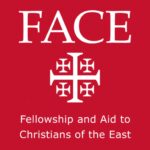It is easy to feel despair of the unjust situation for the Palestinians, who are experiencing daily humiliation, annexation of land, growing settlements, land grabbing and poverty. This year Palestine has been illegally occupied for 53 years. But there are also many people in Palestine cultivating hope, faith and love for transforming the situation.
This interview is part of a series produced for the World Council of Churches (WCC) olive harvest initiative, a global effort in 2020 to highlight the spiritual, economic and cultural importance of the olive harvest for Palestinian communities, and to witness to the impact of the occupation.
By Anne Casparsson
It is easy to feel despair of the unjust situation for the Palestinians, who are experiencing daily humiliation, annexation of land, growing settlements, land grabbing and poverty. This year Palestine has been illegally occupied for 53 years. But there are also many people in Palestine cultivating hope, faith and love for transforming the situation. Below, Fr Jamal Khader, a Christian leader in Palestine, reflects on hardships and hope.
Fr Khader is director of the Latin Patriarch School in Palestine and a parish priest in the Holy Family Church in Ramallah. The congregation includes five different churches in Ramallah.
Would you like to tell a bit about your congregation and your own path to becoming a priest?
Fr Khader: I come from a small Christian village in the West Bank, Zababdeh, and was ordained in 1988. Today I am the director of the Latin Patriarch School, and the general secretary of all 67 Christian schools in Palestine.
Life in Ramallah goes on, but we face many problems and difficulties. People are suffering from financial problems, the pandemic, the occupation, the annexation plan—where they de facto are building more settlements—and a very uncertain political situation. Many are losing hope and our mission as a church is keeping hope alive, even if it is not easy. We are working hard with helping the most vulnerable in our society. We have a very small Christian community left in Palestine, which is difficult for our mission.
What challenges do you see as a Christian leader in Ramallah and Palestine today?
Fr Khader: We face a lot of poverty in our society and a lot of violence, imposed on us by the force of a very unjust situation with the Israeli occupation.
Some of the challenges we face are from our Christian brothers and sisters around the world. As Christians, we believe we are all equal, with the same rights and dignity. That includes even us Palestinians. This is very problematic when we are facing the Zionistic way of thinking in many churches, including a few in the Catholic church, using religion to justify the occupation and annexation of Palestine. They emphasize that the Jews have a divine right to this land. But what does that mean for the Palestinians? Will their rights mean extreme injustice for us?
We are creating seminars on these topics to promote dialog and discussion with different churches in Europe. How can God be a loving God and at the same time promote injustice? The Evangelical Church in Palestine organizes conferences (“Christ at the Checkpoint”) for evangelical church members from the USA every year, two hundred meters from the separation wall. For many of these participants it is an eye opener. They discover a very different reality on the ground, than they had in mind before. It is one way to face theological challenges.
How can faith, hope and love be cultivated in these difficult situations?
Fr Khader: When we talk about peace and justice, every single human is created in God’s image and is my sister and brother. My neighbor is not my enemy but my sister or brother. We apply it in our schools, where we have both Christian and Muslim children. It is about values, human life, justice, and dignity.
We need to keep hope alive, even if we see nothing good coming from the political world. Instead we need to see other signs of hope such as solidarity from the WCC, local work, people around the world praying for us, and young kids here believing in nonviolence.
Love is something very concrete, to fight against evil. Love includes everyone, beginning with those who are suffering most. It is a mission of the church. And we have to embrace even the hardest part: Love your enemy. It is our Christian commandment.
How can the struggle against the occupation best be done from a spiritual point of view?
Fr Khader: As Christians we believe in the strength of prayer. Solidarity with the Palestinians by praying, is an act for justice. The spiritual life will see the image of God in every single human being.
How can we as Christians work and keep believing in peace and justice for Palestinians?
Fr Khader: There are many steps one can take towards justice and peace in Palestine. One is to come and see the situation on the ground. Another is to fight Zionism in the churches. Work instead in favor of true justice and peace. Include the situation in Gaza in your solidarity for Palestine. They live under terrible circumstances. Educate people, work together with the WCC, and be in contact with the Christians in Palestine. Working for justice and peace needs creativity. Be courageous in the theology; be creative in the work for justice and peace. We need all the support from the world.

